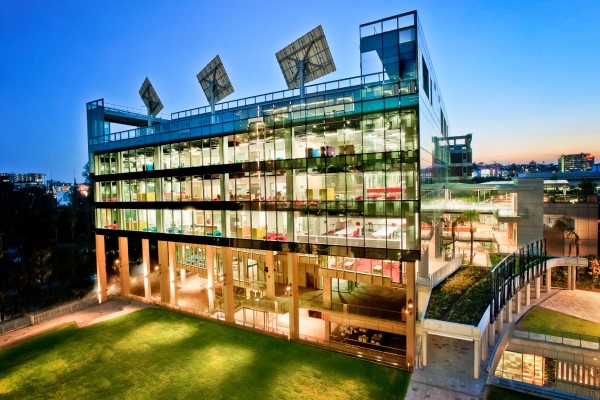QUT is a youthful university that embraces a global perspective. It is driven by ambition and eager to embrace new opportunities with a forward-looking approach.
The university is committed to providing students with practical, hands-on learning experiences that bridge the gap between academia and the real world. This approach ensures that graduates are well-equipped for the careers of the future.
Choosing to study at QUT means gaining access to a world-class education situated in Brisbane, a vibrant, contemporary, and multicultural city. As Australia’s third largest city, Brisbane offers lively urban areas, an outdoor-oriented lifestyle, warm and welcoming locals, and breathtaking natural attractions. With a diverse student community of over 50,000 individuals, including international students from 119 different countries, students will find a sense of belonging and familiarity at QUT.
Scholarship Description:
- Host University: Queensland University of Technology;
- Host Country: Australia;
- Study Level: PhD Level;
- Scholarship Type: Partial Funded;
- Scholarship Worth: 30,000$;
- Eligible Countries: International Students;
- Subjects Available: Science, Engineering, Technology and Mathematics;
- Application Deadline: January 31st, 2024
The International MPhil and PhD Scholarships in Computational Single-Atom Catalyst, are now available for all International and PhD students in the fields of Mathematics, Technology, Engineering, and Science at the Queensland University of Technology, Australia.
The selected individual will join the research group focused on Low Dimensional Sustainable Energy. This collaborative group combines experimental and theoretical expertise to co-design low dimensional materials for sustainable energy applications. Under the guidance of Associate Professor Ting Liao, the candidate will have the opportunity to work in a dynamic environment alongside members from the School of Mechanical, Medical, and Process Engineering and the Centre for Materials Science.
This MPhil or PhD project aims to develop multifunctional single atom catalysts on two-dimensional supports. The objective is to optimize electronic coupling states, achieve favorable coverage of single atom catalysts (SACs), and enhance charge transfer performance. The project also involves the engineering of support surface modifications and coverage on the nanoscale to improve stability and overall catalytic properties. These efforts are directed towards meeting the demands of sustainable energy conversion and storage applications. Advanced Density Functional Theory based computati
Scholarship Benefits:
The Queensland University of Technology will provide a 30,000$ in order to cover all the candidate’s financial expensive.
Eligibility Requirements:
To be deemed eligible, candidates must satisfy the following conditions:
- Applicants must be classified as domestic.
- Potential applicants must have already identified, or plan to identify, a research project within the School of Mechanical, Medical, and Process Engineering, which is affiliated with CBT.
- Applicants are required to propose a supervisor and establish communication with them prior to submitting an Expression of Interest.
- Candidates must showcase an exceptional academic background, including a first-class bachelor’s degree in biomedical sciences or first-class honors, along with evidence of high-quality research contributions and relevant industry experience.
- Applicants must have the ability to commence their studies onshore no later than July 2023.
Supporting Documents:
Applicants for the International MPhil or PhD Scholarships in Computational Single-Atom Catalysts at Queensland University of Technology are required to submit a set of supporting documents along with their application. These documents typically include:
- Academic Transcripts: Applicants must submit official transcripts or academic records from all prior undergraduate and postgraduate studies. These should provide details of the courses taken, grades achieved, and the overall academic performance.
- Degree Certificates: Copies of degree certificates or completion certificates for all completed qualifications, including undergraduate and postgraduate degrees.
- Curriculum Vitae (CV): A comprehensive resume that outlines the applicant’s educational background, research experience, publications (if any), relevant work experience, and any other relevant achievements or qualifications.
- Research Proposal: A detailed research proposal outlining the specific area of interest within computational single-atom catalysts that the applicant wishes to pursue. The proposal should include research objectives, methodology, potential contributions to the field, and a timeline for completion.
- English Language Proficiency: Typically, international candidates who do not have English as their native language are expected to present proof of their English language proficiency. This requirement can be fulfilled by submitting scores from recognized standardized English language tests like IELTS or TOEFL.
- Letters of Recommendation: Applicants are usually required to provide two or three letters of recommendation from academic referees who can speak to the applicant’s research abilities, academic potential, and suitability for the program.
- Personal Statement: A personal statement or statement of purpose where applicants can discuss their motivation for pursuing research in computational single-atom catalysts, their career goals, and how this scholarship aligns with their aspirations.
Application Process:
To initiate the process, applicants should send an email to Associate Professor Ting Liao, providing information about their academic and research experiences, expressing their motivation to pursue research in the specific field, and demonstrating their interest in the scholarship opportunity. It is important to include a CV along with the email.
Official website:
For more information, please check the university’s official website:
